- Home
- Lisa Kleypas
Cold-Hearted Rake Page 24
Cold-Hearted Rake Read online
Page 24
And then someday… it would all fall apart, and she would be devastated.
Forcing herself to pull away from him, she stared at him with equal parts misery and resolve. “I can’t have an affair with you.”
Devon’s expression was instantly remote.
“You want more than that?”
“No,” she said feelingly. “I can’t conceive of any kind of relationship with you that would end in anything other than misery.”
That seemed to pierce through his detachment like a steel-tipped arrow.
“Would you like references?” he asked, his tone edged with coolness. “Attesting to my satisfactory performance in the bedroom?”
“Of course not,” she said shortly. “Don’t be snide.”
His gaze shot to hers, a smolder awakening in the depths of blue. “Then why refuse me? And why deny yourself something you want? You’ve been married – no one would expect virginity of you. It would harm no one if you and I took pleasure in each other’s company.”
“It would harm me, eventually.”
He stared at her with baffled anger. “Why do you say that?”
“Because I know myself,” she said. “And I know you well enough to be certain that you would never intentionally hurt any woman. But you’re dangerous to me. And the more you try to convince me otherwise, the more obvious it becomes.”
Helen spent three days in Rhys Winterborne’s room, babbling incessantly while he lay there feverish and mostly silent. She became heartily tired of the sound of her own voice, and said something to that effect near the end of the second day.
“I’m not,” he said shortly. “Keep talking.”
The combination of Winterborne’s broken leg, the fever, and the enforced bed rest had made him surly and ill tempered. It seemed that whenever Helen wasn’t there to entertain him, he vented his frustration on everyone within reach, even snapping at the poor housemaid who came in the morning to clean and light the grate.
After having run through childhood anecdotes, detailed histories of the Ravenel family, and descriptions of all her tutors, favorite pets, and the most picturesque walks around Eversby, Helen had gone in search of reading material. Although she had attempted to interest Winterborne in a Dickens novel, he had rejected it categorically, having no interest in fiction or poetry. Next Helen had tried newspapers, which had been deemed acceptable. In fact, he wanted her to read every word, including the advertisements.
“I’m amazed that you’re willing to read to him at all,” Kathleen said when Helen told her about it later. “If it were me, I wouldn’t bother.”
Helen glanced at her with mild surprise. They were in the orchid house, where Kathleen was helping her with the painstaking task of hand pollinating vanilla blossoms. “You sound as if you don’t like Mr. Winterborne.”
“He’s terrified the housemaids, cursed Mrs. Church, insulted Sims, and was rather short-tempered with me,” Kathleen said. “I’m beginning to think the only member of the household he hasn’t offended is the pig, and that’s only because Hamlet hasn’t gone into his room yet.”
“He’s had a fever,” Helen protested.
“You must at least concede that he’s grumpy and demanding.”
Helen’s lips tightened against a smile as she admitted, “Perhaps a little demanding.”
Kathleen laughed. “I’ve never been more impressed with your ability to manage difficult people.”
Helen pried a pale yellow flower open to find the pollen-tipped rod within. “If living in a house of Ravenels hasn’t been adequate preparation, I can’t fathom what would be.” Using a toothpick, she collected grains of pollen and applied them to the nectar, which was hidden beneath a tiny flap in the stigma. Her hands were adept from years of practice.
After finishing a flower, Kathleen gave her sister-in-law a puzzled glance. “I’ve always wondered why you’re the only one who doesn’t have a temper. I’ve never seen you in a rage.”
“I’m quite capable of anger,” Helen assured her wryly.
“Anger, yes. But not the kind of fury in which you shout and throw things, and make nasty remarks you’ll later regret.”
Helen worked diligently on the vanilla vine as she replied. “Perhaps I’m a late bloomer. I could develop a temper later.”
“Heavens, I hope not. If you do, we’ll have no kind, calm person to soothe savage beasts such as Mr. Winterborne.”
Helen sent her a quick sidelong smile. “He’s not savage. He’s accustomed to being the center of much activity. It’s difficult for a man with a forceful nature to be idle and ill.”
“He is better today, however?”
“Decidedly. And the ophthalmologist arrives today to examine his vision.” Helen paused, opening another flower. “I expect that Mr. Winterborne’s disposition will improve a hundredfold when he’s able to see again.”
“What if he can’t?”
“I pray that he will.” Considering the question, Helen looked troubled. “I think… he wouldn’t be able to bear anything that he thought of as a weakness in himself.”
Kathleen regarded her with wry sadness. “There are times in life when all of us have to bear the unbearable.”
After the last of the vanilla blossoms had been pollinated, Helen and Kathleen returned to the house and discovered that the ophthalmologist, Dr. Janzer, had already arrived. He was in the process of examining Winterborne’s eyes, while Dr. Weeks and Devon stayed in the room with them. Despite a few shameless attempts at eavesdropping, no one had been able to hear anything through the closed door.
“The number of ocular specialists in England, at Janzer’s level of expertise,” West said as he and the rest of the family waited in the private upstairs parlor, “can be counted on the fingers of one hand. He’s been trained to use an ophthalmoscope, which is a device that reflects light to allow him to look directly into the living eye.”
“Into the pupil?” Cassandra asked, looking amazed. “What can be seen in there?”
“Nerves and blood vessels, I imagine.”
Pandora, who had left the parlor a few minutes earlier, rushed to the threshold and announced dramatically, “Mr. Winterborne can see!”
Helen drew in a quick breath, her heart clattering. “How do you know, dear?” she asked calmly.
“I overheard him reading letters from an eye chart.”
Kathleen gave Pandora a chiding glance. “I asked you not to listen at the door, Pandora.”
“I didn’t.” Pandora held up an empty glass. “I went into the adjoining room and put this against the wall. When you bring your ear close enough, you can make out what they’re saying.”
“I want to try!” Cassandra exclaimed.
“You will do no such thing,” Kathleen told her, motioning for Pandora to come into the parlor and sit. “Mr. Winterborne is entitled to his privacy. We’ll learn soon enough if his vision is intact.”
“It is,” Pandora said smugly.
“Are you certain?” Helen couldn’t restrain herself from asking.
Pandora gave her an emphatic nod.
Helen retained her ladylike posture, but inside she wilted with relief, and prayed silently in gratitude.
“Thank God,” she heard West, who was lounging beside her on the settee, say quietly.
While the others in the room continued their conversation, Helen asked West, “Were you not optimistic about Mr. Winterborne’s vision?”
“I expected it would turn out well enough, but there was still a chance that something might have gone wrong. I would hate for that to happen to Winterborne. He’s not one to suffer hard knocks with forbearance and grace.”
Helen gathered that not all of Winterborne’s impatience was a result of being confined to a sickroom. “I had imagined that a man who owned a department store would be very charming and put people at ease.”
West grinned at that. “He can be. But the moments when he’s charming and putting people at ease are when he’s most dangerous. Never
trust him when he’s nice.”
Her eyes rounded with surprise. “I thought he was your friend.”
“Oh, he is. But have no illusions about Winterborne. He’s not like any man you’ve ever known, nor is he someone your parents would have allowed you to meet in society.”
“My parents,” Helen said, “had no intention of allowing me to meet anyone in society.”
Staring at her keenly, West asked, “Why is that, I wonder?”
She was silent, regretting her comment.
“I’ve always thought it odd,” West remarked, “that you’ve been obliged to live like a nun in a cloister. Why didn’t your brother take you to London for the season when he was courting Kathleen?”
She met his gaze directly. “Town held no interest for me; I was happier staying here.”
West’s hand slid over hers and squeezed briefly. “Little friend… let me give you some advice that may prove helpful in the future, when you’re in society. When you lie, don’t fidget with your hands. Keep them still and relaxed in your lap.”
“I wasn’t —” Helen broke off abruptly. After a slow breath, she spoke calmly. “I wanted to go, but Theo didn’t think I was ready.”
“Better.” He grinned at her. “Still a lie… but better.”
Helen was spared the necessity of replying as Devon came to the doorway. Smiling, he spoke to the room in general. “According to Dr. Janzer, Winterborne’s eyes have healed well, and his vision is exceptional.” He paused as glad exclamations rippled through the group. “Winterborne is tired after the examination. Later we can visit him at intervals, rather than go all at once and gape as if he were a gibbon at the Bristol Zoo.”
Chapter 23
W
ith his vision restored, and the fever gone, Rhys felt almost like his usual self. A surge of impatient energy coursed through him as his mind was overrun with thoughts of his store. He needed to communicate with his managers, his press officer, his private secretary, his suppliers and manufacturers. Although he trusted his staff to carry on competently for the short term, their work would soon become slipshod if he was not there to supervise. The store had just opened a book department – how had the first two weeks of sales gone? An expanded and remodeled refreshment room would be unveiled in a month – had the carpenters and technicians kept to their schedule?
Stroking his jaw, he discovered that he was as bristly as a hedgehog. Disgruntled, he rang the bell at his bedside. After a half hour had passed and no one had arrived, Rhys was about to reach for the bell again, when a white-haired, elderly man arrived. He was a short, burly fellow, dressed in a simple black swallowtail coat and dark gray trousers. His plain, unremarkable face had the appearance of an unevenly risen bread loaf, the nose somewhat bulbous… but the dark currant eyes set beneath the snowy frills of his brows were wise and kindly. Introducing himself as Quincy, the valet asked how he might be of service.
“I need a wash and shave,” Rhys said. In a rare self-deprecating moment, he added, “Obviously you have your work cut out for you.”
The valet didn’t crack a smile, only replied pleasantly, “Not at all, sir.”
Quincy left to make preparations, and soon returned with a tray of shaving supplies, scissors and shining steel implements, and glass bottles filled with various liquids. At the valet’s direction, a footman brought in a tall stack of toweling, two large cans of hot water, and a washtub.
Clearly the valet intended to groom him beyond a simple wash and shave. Rhys glanced at the accumulation of supplies with a touch of suspicion. He had no personal valet, something he had always considered as an upper-class affectation, not to mention an invasion of his privacy. Usually he shaved his own face, cut his own fingernails, washed with plain soap, kept his teeth clean, and twice a month went to a Mayfair barber for a hair trimming. That was the limit of his primping.
The valet set to work on his hair first, draping toweling around his neck and shoulders, and dampening the unruly locks. “Do you have preferences as to length and style, sir?”
“Do what you think best,” Rhys said.
After donning a pair of spectacles, Quincy began to cut Rhys’s hair, scissoring through the heavy layers with calm confidence. Answering questions readily, he revealed that he had served as valet to the late Earl of Trenear, and the earl before him, having worked for the Ravenel family for a total of thirty-five years. Now that the current earl had brought his own valet with him, Quincy had been relegated to providing assistance to visiting guests, and otherwise assisted the underbutler with tasks such as polishing the silver and helping the housekeeper with the mending.
“You know how to sew?” Rhys asked.
“Of course, sir. It’s a valet’s responsibility to keep his master’s clothing in perfect repair, with no frayed seams or missing buttons. If alterations are needed, a valet should be able to perform them on the spot.”
Over the next two hours, the elderly man washed Rhys’s hair and smoothed it with a touch of pomade, steamed his face with hot towels, shaved him, and tended his hands and feet with a variety of implements. Finally Quincy held up a looking glass, and Rhys viewed his reflection with a touch of surprise. His hair was shorter and well shaped, his jaw shaved as smooth as an eggshell. His hands had never looked so clean, the surfaces of his fingernails buffed to a quiet gleam.
“Is it satisfactory, sir?” Quincy asked.
“It is.”
The valet proceeded to put away the supplies, while Rhys watched him with a contemplative frown. It seemed that he had been wrong about valets. No wonder Devon Ravenel and his like always appeared so impeccable and smart.
The valet proceeded to help him don a fresh nightshirt, borrowed from West, and a dressing robe made of diamond quilted black velvet, with a silk shawl collar and sash and silk cord trim. Both were finer than any garments that Rhys had ever owned.
“Do you think a commoner should dare to dress like a blue blood?” Rhys asked as Quincy pulled the hem of the robe over his legs.
“I believe every man ought to dress as well as he is able.”
Rhys’s eyes narrowed. “Do you think it’s right for people to judge a man for what he wears?”
“It is not for me to decide whether it is right, sir. The fact is, they do.”
No answer could have pleased Rhys more; it was the kind of pragmatism that he had always understood and trusted.
He was going to hire Quincy, no matter what it took. No one else would do: Rhys needed someone old and experienced, who was familiar with the aristocracy’s intricate rules of etiquette and fashion. Quincy, formerly a valet to two earls, would provide him with necessary insurance against looking like a fool.
“What is your annual salary?” Rhys asked.
The valet looked taken aback. “Sir?”
“Thirty pounds, I would guess.” Reading the other man’s expression, Rhys deduced that the figure was a bit high. “I’ll give you forty,” he said coolly, “if you’ll valet for me in London. I have need of your guidance and expertise. I’m an exacting employer, but I’m fair, I pay well, and I’ll give you opportunities for advancement.”
Buying time, the valet removed his spectacles, cleaned the lenses, and placed them into his coat pocket. He cleared his throat. “At my age,” he said, “a man doesn’t usually consider changing his life and moving to an unfamiliar place.”
“Do you have a wife here? Family?”
After a brief but telling hesitation, the valet replied, “No, sir. However, I have friends in Hampshire.”
“You can make new ones in London,” Rhys said.
“May I ask, sir, if you reside in a private house?”
“Yes, it’s next to my store, in a separate but connected building. I own all the property on Cork Street, and the mews behind it, and I’ve recently bought the block of Clifford that runs up against Savile Row. My servants work six days a week with the usual holidays off. Like the store employees, you’ll have the benefit of a private doctor and a d
entist. You can eat at the staff canteen without charge, and you’ll be given a discount for anything you wish to buy at Winterborne’s.” Rhys paused, able to smell indecision as keenly as a foxhound on the hunt. “Come, man,” he said softly, “you’re wasted here. Why spend the rest of your years dwindling in the country, when you could be of use to me? You have plenty of work left in you, and you’re not too old for the delights of London.” Reading Quincy’s uncertainty, he went for the kill. “Forty-five a year. That’s my last offer.”

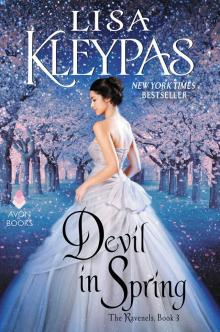 Devil in Spring
Devil in Spring Sugar Daddy
Sugar Daddy Devil in Winter
Devil in Winter Dreaming of You
Dreaming of You Christmas Eve at Friday Harbor
Christmas Eve at Friday Harbor Love, Come to Me
Love, Come to Me Only With Your Love
Only With Your Love Suddenly You
Suddenly You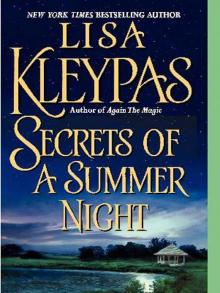 Secrets of a Summer Night
Secrets of a Summer Night Cold-Hearted Rake
Cold-Hearted Rake Where's My Hero?
Where's My Hero? Gifts of Love
Gifts of Love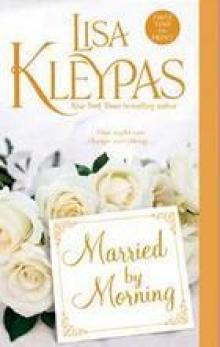 Married by Morning
Married by Morning Then Came You
Then Came You Wish List
Wish List Where Dreams Begin
Where Dreams Begin A Historical Christmas Present
A Historical Christmas Present Somewhere I'll Find You
Somewhere I'll Find You Scandal in Spring
Scandal in Spring Someone to Watch Over Me
Someone to Watch Over Me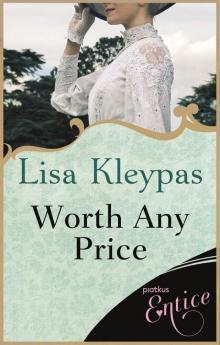 Worth Any Price
Worth Any Price Prince of Dreams
Prince of Dreams It Happened One Autumn
It Happened One Autumn Love in the Afternoon
Love in the Afternoon Devil's Daughter
Devil's Daughter A Wallflower Christmas
A Wallflower Christmas Tempt Me at Twilight
Tempt Me at Twilight Brown-Eyed Girl
Brown-Eyed Girl Mine Till Midnight
Mine Till Midnight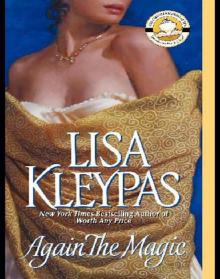 Again the Magic
Again the Magic Lady Sophia's Lover
Lady Sophia's Lover Because You're Mine
Because You're Mine Midnight Angel
Midnight Angel Smooth-Talking Stranger
Smooth-Talking Stranger Blue-Eyed Devil
Blue-Eyed Devil Hello Stranger
Hello Stranger Dream Lake
Dream Lake Devil's Daughter: The Ravenels Meet the Wallflowers
Devil's Daughter: The Ravenels Meet the Wallflowers A Christmas to Remember
A Christmas to Remember Smooth Talking Stranger
Smooth Talking Stranger Crystal Cove
Crystal Cove Marrying Winterborne
Marrying Winterborne Stranger in My Arms
Stranger in My Arms Devil in Disguise
Devil in Disguise Worth Any Price bsr-3
Worth Any Price bsr-3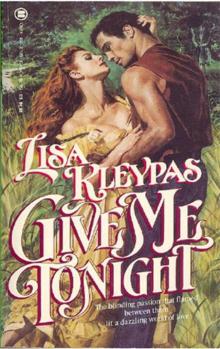 Give Me Tonight
Give Me Tonight Rainshadow Road fh-2
Rainshadow Road fh-2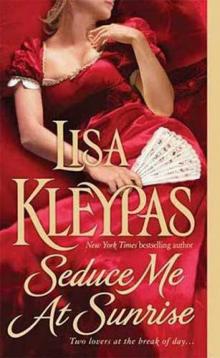 Seduce Me At Sunrise
Seduce Me At Sunrise I Will
I Will Someone to Watch Over Me bsr-1
Someone to Watch Over Me bsr-1 Lady Sophias Lover bsr-2
Lady Sophias Lover bsr-2 A Hathaway Wedding
A Hathaway Wedding A Hathaway Wedding (Hathaways Bk2.5)
A Hathaway Wedding (Hathaways Bk2.5) Worth Any Price - Bow Street 3
Worth Any Price - Bow Street 3 Christmas with Holly
Christmas with Holly